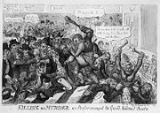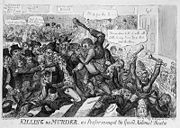
Old Price Riots, 1809
Encyclopedia
The Old Price Riots of 1809 (also sometimes referred to as the O.P. or OP riots) were caused by rising prices at the new Theatre at Covent Garden
, London
, after the previous one had been destroyed by fire. Covent Garden was one of two “patent” theatres in London in the nineteenth century, along with Drury Lane. When Drury Lane was burned down, Covent Garden became the premiere theatre in that time. The riots lasted three months, and ended with John Philip Kemble
, the manager of the theatre, being forced to make a public apology.
The new theatre opened on 18 September 1809. The cost of constructing and furnishing the building, however, was so high that the management was forced to raise the prices from six shilling
s to seven for the boxes, from 3 shillings and sixpence
to four shillings for the pit, and the third tier, usually reserved for the public, was converted into private boxes at a rent of £300 per year. The gallery price was unchanged but often referred to as "pigeon holes" since people inside could only see the legs of the performers
On the opening night, riots broke out during a performance of Macbeth
and continued throughout the play. At the end, the audience refused to leave so Kemble sent for the Bow Street
police, but this only made the situation worse, and the rioters did not disperse until 2AM. After the first night, the rioters only came in at half price time, and the inside of the theatre was covered with banners and slogans. Newspapers and journals commented that a large reason why the audiences were so outraged was due to a lack of dialogue between the patrons and the manager, and never a clear explanation of why the raised prices were necessary
At one point, a coffin was carried in with the message "Here lies the body of the new price, which died of the whooping cough on 23 September 1809, aged 6 days". The riots were to last another 64 days. However, unlike earlier riots, no damage was done to the theatre and the whole affair was done in a "spirit of fun". http://www.jasa.net.au/london/theatre.htm The rioters even had a name for themselves: the OPs. The OPs stretched across class and cultural lines-ranging from businessmen to peasants- and pushed Kemble to lower the prices.
Kemble did so (and also issued an apology) and the situation returned to normal, until he tried to maintain half the number of private boxes at the start of the next season - the riots started again, forcing him to withdraw his plan.
 In an attempt to quell the rioters Kemble hired the Jewish boxer Daniel Mendoza
In an attempt to quell the rioters Kemble hired the Jewish boxer Daniel Mendoza
and his associates to contain them. This tactic misfired and resulted in increased violence, as shown in the contemporary caricature
by Isaac Robert Cruikshank
, Killing No Murder as Performing at the Grand National Theatre . Mendoza can be seen at the centre, utering the words 'Down down to H--l with all OPs & say twas Dan that sent thee there.' Mendoza, who had lost his championship in 1795 and was now in his mid forties, was already semi-retired; he had turned down a return match against Lee in 1807 saying that he was devoted only to teaching the sport. It seems that his participation in the OP Riots also lost him following with his supporters amongst the poorer folk of London, who now saw him fighting on behalf of the 'toffs'. Some of Mendoza's biographers therefore see the incident as a turning point in his popularity, although he still gave occasional demonstration bouts.
Covent Garden
Covent Garden is a district in London on the eastern fringes of the West End, between St. Martin's Lane and Drury Lane. It is associated with the former fruit and vegetable market in the central square, now a popular shopping and tourist site, and the Royal Opera House, which is also known as...
, London
London
London is the capital city of :England and the :United Kingdom, the largest metropolitan area in the United Kingdom, and the largest urban zone in the European Union by most measures. Located on the River Thames, London has been a major settlement for two millennia, its history going back to its...
, after the previous one had been destroyed by fire. Covent Garden was one of two “patent” theatres in London in the nineteenth century, along with Drury Lane. When Drury Lane was burned down, Covent Garden became the premiere theatre in that time. The riots lasted three months, and ended with John Philip Kemble
John Philip Kemble
John Philip Kemble was an English actor. He was born into a theatrical family as the eldest son of Roger Kemble, actor-manager of a touring troupe. His elder sister Sarah Siddons achieved fame with him on the stage of the Theatre Royal, Drury Lane...
, the manager of the theatre, being forced to make a public apology.
Causes
On 20 December 1808, the original Covent Garden Theatre was destroyed by a fire along with most of the scenery, costumes and scripts. The damage was estimated at £150 000. However, a public subscription was introduced by the Duke of York, King George III and the Duke of Northumberland, which contributed £76,000.The new theatre opened on 18 September 1809. The cost of constructing and furnishing the building, however, was so high that the management was forced to raise the prices from six shilling
Shilling
The shilling is a unit of currency used in some current and former British Commonwealth countries. The word shilling comes from scilling, an accounting term that dates back to Anglo-Saxon times where it was deemed to be the value of a cow in Kent or a sheep elsewhere. The word is thought to derive...
s to seven for the boxes, from 3 shillings and sixpence
Sixpence
Sixpence may refer to:*Sixpence *Sixpence *Sixpence *Flat cap, also called a sixpence*Sixpence None the Richer, an American pop/rock band...
to four shillings for the pit, and the third tier, usually reserved for the public, was converted into private boxes at a rent of £300 per year. The gallery price was unchanged but often referred to as "pigeon holes" since people inside could only see the legs of the performers
On the opening night, riots broke out during a performance of Macbeth
Macbeth
The Tragedy of Macbeth is a play by William Shakespeare about a regicide and its aftermath. It is Shakespeare's shortest tragedy and is believed to have been written sometime between 1603 and 1607...
and continued throughout the play. At the end, the audience refused to leave so Kemble sent for the Bow Street
Bow Street
Bow Street is a thoroughfare in Covent Garden, Westminster, London. It features as one of the streets on the standard London Monopoly board....
police, but this only made the situation worse, and the rioters did not disperse until 2AM. After the first night, the rioters only came in at half price time, and the inside of the theatre was covered with banners and slogans. Newspapers and journals commented that a large reason why the audiences were so outraged was due to a lack of dialogue between the patrons and the manager, and never a clear explanation of why the raised prices were necessary
At one point, a coffin was carried in with the message "Here lies the body of the new price, which died of the whooping cough on 23 September 1809, aged 6 days". The riots were to last another 64 days. However, unlike earlier riots, no damage was done to the theatre and the whole affair was done in a "spirit of fun". http://www.jasa.net.au/london/theatre.htm The rioters even had a name for themselves: the OPs. The OPs stretched across class and cultural lines-ranging from businessmen to peasants- and pushed Kemble to lower the prices.
Kemble did so (and also issued an apology) and the situation returned to normal, until he tried to maintain half the number of private boxes at the start of the next season - the riots started again, forcing him to withdraw his plan.
Daniel Mendoza and the Old Price Riots

Daniel Mendoza
Daniel Mendoza was an English prizefighter, who was boxing champion of England 1792–95.-Success:...
and his associates to contain them. This tactic misfired and resulted in increased violence, as shown in the contemporary caricature
Caricature
A caricature is a portrait that exaggerates or distorts the essence of a person or thing to create an easily identifiable visual likeness. In literature, a caricature is a description of a person using exaggeration of some characteristics and oversimplification of others.Caricatures can be...
by Isaac Robert Cruikshank
Isaac Robert Cruikshank
Isaac Robert Cruikshank, sometimes known as Robert Cruikshank was a caricaturist, illustrator, and portrait miniaturist, the less well-known brother of George Cruikshank, both sons of Isaac Cruikshank. Born in Middlesex, where he and his brother George attended school in Edgware...
, Killing No Murder as Performing at the Grand National Theatre . Mendoza can be seen at the centre, utering the words 'Down down to H--l with all OPs & say twas Dan that sent thee there.' Mendoza, who had lost his championship in 1795 and was now in his mid forties, was already semi-retired; he had turned down a return match against Lee in 1807 saying that he was devoted only to teaching the sport. It seems that his participation in the OP Riots also lost him following with his supporters amongst the poorer folk of London, who now saw him fighting on behalf of the 'toffs'. Some of Mendoza's biographers therefore see the incident as a turning point in his popularity, although he still gave occasional demonstration bouts.

